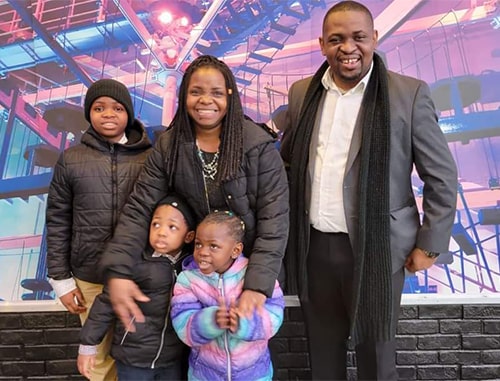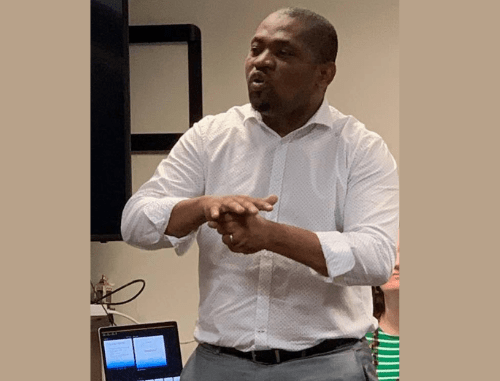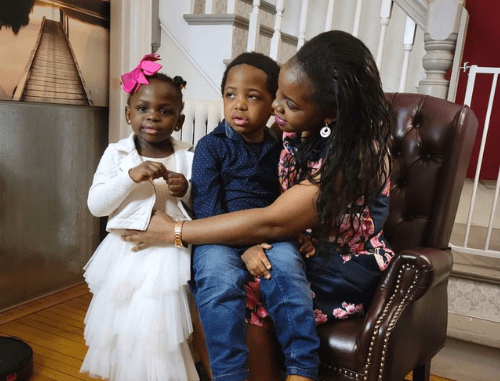Register for FY25
Full-Year Financial and Programmatic Results
For Luc Samuel Kuanzambi and His Family, a Desperate Journey Leads to a New Life in Maine

Luc Samuel Kuanzambi and his wife Paulette were a happy young couple living in South Africa with very promising professional careers. They had a five-year-old son, Lael, and a newborn daughter, Ticvah.
Little did they know they were heading into some tremendously difficult times. A month and a half after Ticvah’s birth, the baby developed jaundice and it was determined she would most likely need a liver transplant. The frantic parents began calling everywhere for help and advice. They were advised by medical contacts not to have the procedure done in South Africa where transplants were still experimental.
Taking their plight to social media, Luc and Paulette were told about a hospital in Omaha, Nebraska with the capacity to provide a second opinion and possibly perform the transplant, but they would have to raise the money on their own. With no other options, the family applied for and obtained a medical visa, left nearly all of their possessions behind, and headed for Omaha. They managed to raise a little over $30,000 from local community donors and online appeals, far short of the $750,000 required by the hospital. As a result, all the hospital could do was stabilize Ticvah.
Luc couldn’t work, rent a house, or buy medical insurance because he lacked a Social Security number, so the family lived off the kindness of strangers, staying for a few nights in various charity homes and relying on charity for food and essentials. Five months after arriving in Omaha, with Ticvah’s condition worsening, their visas about to expire and $116,000 in debt, they left Nebraska for Maine, where Luc had a cousin who told them that they could expect more generosity. Arriving in Maine on a hot July night, the heat aggravated Ticvah’s condition and was hard on Paulette, who was now pregnant. The family hadn’t eaten all day. Luc said he prayed and wept that night.

“I felt broken. I was wiped out of everything, we were so afraid our daughter would die, and my family was facing the reality of living in poverty. We had no idea what to do next.”
In Maine, the family’s fortunes finally changed. A community shelter, where other African immigrants were staying, welcomed them with open arms. At Maine Medical Center, Luc and Paulette talked to social workers, who explained that Ticvah had legal protections in Maine and that the family qualified for emergency housing while Ticvah was hospitalized. When her condition worsened, the miracle they had so desperately sought finally arrived—Ticvah was sent to Boston for a liver transplant at no cost to the family.
“I don’t know who footed the bill,” Luc said. “We were just told at the hospital not to worry about money.”

In the midst of the crisis Luc was connected to Maine’s Families Forward, a statewide program funded by the Department of Health and Human Services and operated by Fedcap, Inc. Families Forward provides support and services to refugees and immigrants from more than 22 different countries and was well-positioned to help Luc and his family settle into a community where they could put down roots. They sponsored Paulette’s driver training and certified nurse assistant (CNA) training; Paulette is now on track to become a registered nurse. Fedcap was able to secure funding for the renewal of Paulette’s work permit, and is doing the same for Luc.
Luc eagerly undertook workforce training as he was eager to get off public assistance. “So many immigrants face the same struggle,” he said. “All our background means nothing and our work history is wiped out. I did not want to be a liability and my goal is to be independent as soon as possible.”
Today life is so much better. Ticvah, now five, is doing amazing—she has so much confidence and such a “strong personality”. Lael, now 11, is a gifted piano player and Alexander-King, the youngest child born in Portland, Maine four years ago, is showing signs of being gifted in math.
Luc has become a powerful advocate for Maine’s immigrant community. On October 28, 2021, he gave a presentation to Families Forward leadership and funders about the immigrant experience, the challenges he and his family faced, and the value of Families Forward and the kind of immigrant services and support they received from the staff of Fedcap.
“These programs are lifesaving,” Luc said. “Without Families Forward and the support of the community and local benefactors, our daughter would not be alive today. Families Forward made it possible for us to begin building a new life.”
-min.avif)


